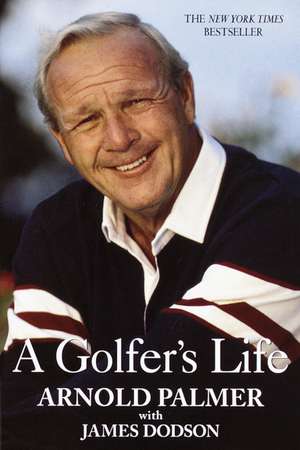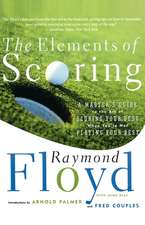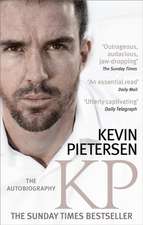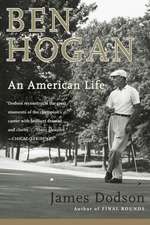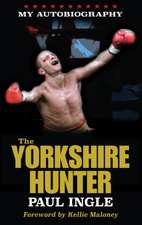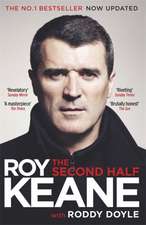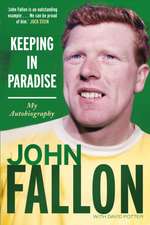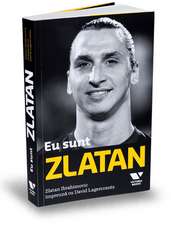A Golfer's Life
Autor Arnold Palmer James Dodsonen Limba Engleză Paperback – 31 ian 2000
Writing with the humor and candor that are as much his trademark as his unique golf swing, Palmer narrates the deeply moving story of his life both on and off the links. He recounts the loving relationship he shared with his father, "Deacon" Palmer, the course superintendent and head professional at the Latrobe Country Club where young Arnie developed his game, his friendships and rivalries with golf greats, his enduringly happy marriage with Winnie, his legendary charges to triumph and titanic disasters, and his valiant battle against cancer and remarkable recovery.
Arnold Palmer has lived one of the great sporting lives of the twentieth century. Now, with the help of acclaimed golf writer James Dodson, he has created one of the great sports autobiographies of our time.
Preț: 124.80 lei
Nou
23.88€ • 24.93$ • 19.72£
Carte disponibilă
Livrare economică 25 martie-08 aprilie
Specificații
ISBN-10: 0345414829
Pagini: 450
Dimensiuni: 140 x 209 x 26 mm
Greutate: 0.41 kg
Editura: BALLANTINE BOOKS
Notă biografică
From the Hardcover edition.
Extras
The driveway crosses a small brook and two fairways, the steep downhill first and the long uphill 18th. We paused to allow a couple of late finishers--two boys carrying their own bags--to hit their final approach shots on 18. Winnie reached over and took my hand and commented that I seemed awfully quiet--and was driving awfully slowly--for a man who had a big speech to make in a few minutes.
Under normal circumstances I enjoy giving speeches, and I seldom use a prepared text, because years ago I discovered that speaking to people straight from the heart about a subject you love may be a bit more risky, but the rewards are almost always greater in the end. That's just my style, I guess--the way I prefer to play golf and the way I prefer to speak to people.
This crowd was different, however. The occasion was my fiftieth high school reunion, and at that moment almost two hundred people from Latrobe High's Class of 1947 were gathered in the upstairs dining room or sipping cocktails on the adjacent lawn, waiting for their unofficial host to arrive and get the festivities under way.
I hadn't seen many of these folks in over half a century--a thought that probably astounded them as much as it did me. How could that time have gone by so rapidly? Most of those in attendance, I knew, now lived other places and had come back to Latrobe from great distances. Others there were some of my closest friends on earth. But all of them had known me long before I became a famous public figure named Arnold Palmer. To them, I was simply "Arnie" Palmer, the skinny, golf-crazy son of Deke and Doris Palmer, the boy who would grow up and do well enough to buy the club where once upon a time he was permitted on the course only before the members arrived in the morning or after they had gone home in the evening.
I peered through the windshield and watched as one of the boys made a strong swing, and I remember commenting to Winnie, as his ball flew away in the twilight toward an unseen flag up the hill, "He may like that better than he knows." I knew what that boy was feeling, because I'd hit that final shot--perhaps from that very spot--thousands of times myself over the past fifty or sixty years. And every time, it filled me with a mixture of hope and wonder.
The boys picked up their bags and moved on. Wrapped in the spell of the game, they probably didn't have a clue or a care in the world who was watching them, and that's exactly as it should be, a tribute to this marvelous game we play. There is something magical about finishing a golf round in the dusk.
Driving on, I admitted to Winnie that I was a bit worried about what I was going to say to the folks on the hill, and she knew why without my having to say anything more. It wasn't being sixty-eight that was chewing away at me or even the slight bittersweet feeling I often experience with September's arrival--brought on by the knowledge that another golf season is slowly winding down. The truth was, several things had happened to us in the preceding year that made this homecoming all the more poignant, and therefore somewhat difficult for me.
She simply squeezed my hand and assured me that when it came time to speak, she knew I would do just fine.
"Oh really?" I said, with mock annoyance. "And what makes you so sure about that?"
She smiled that simple, no-nonsense smile of hers I've always loved and found so comforting, whether I set the course record or shot 80 in the final round.
"Don't forget, lover," she said, "I've known you a few years, too."
In life as in golf, we all encounter turning points, moments of trial when everything accomplished up till then falls away and everything we stand for and believe is summoned forth for thorough examination. On the golf course, I've been fortunate enough to come out on the happy end of several such trials. But a few days after the 1997 New Year's holiday, I faced a more urgent moment of self-reflection. The phone rang at La Costa Resort and Spa, in Carlsbad, California, where I was preparing to give a speech and present the Arnold Palmer Award to Tom Lehman at the annual PGA Tour Awards dinner at the kickoff event for the PGA Tour's new season. Winnie was on the other end of the line, and her voice immediately told me something was wrong. A moment later I knew what it was. For several years during my regular periodic physical examinations, I'd scored elevated PSA tests, but several precautionary biopsies had all come back negative. The most recent one, however, had not. Winnie had called to inform me I had pro
state cancer.
The very word cancer can send a cold blade of terror cutting through the strongest man or woman. I remember feeling a great gutted hollowness inside, followed by a wave of anger at the injustice of the verdict. Why me? Why now? My physicians were quick to point out that there was no particular hurry to confront this frightening opponent--I could delay surgery indefinitely, even decline it, if I so chose. There were even other procedures and treatment strategies available. The decision was up to me, they said.
"Well," I remember replying almost without hesitation, "if you're leaving it up to me, I think there's only one thing to do. Let's get the damn thing out."
In retrospect, this was the only course of action I could honestly think to follow. Get it out, get it done with, so I could get on with my life--back to the golf course and back to my work and family. I had so much I still wanted to do, so many things I still wanted to accomplish; why, even my golf game was showing new signs of vitality after a few years of less-than-inspiring play. The cancer couldn't have come at a more inconvenient moment (if there ever is a convenient moment). I'm sure everyone who faces this terrifying news has felt this way at some point or another.
I promptly canceled all my business appointments and withdrew from the following week's Bob Hope Chrysler Classic, a tournament Ihad played in since it was started in 1960 and had won five times. Then I flew home to Orlando to be with Winnie and my daughter Amy and consulted with my doctors. The next day, we flew north to the famed Mayo Clinic in Rochester, Minnesota, and three days after that the job was done.
For the first time in my adult memory, I didn't play much golf that spring. I spent weeks recovering at our condo at the Bay Hill Club and Lodge in Orlando, watching the golf season unfold on television and reading an avalanche of get-well cards and letters I received from concerned people all over the world. I can't really express how grateful I was for these cards and letters. Cancer can make you feel so alone. Friends I hadn't spoken to in twenty years got in touch, strangers shared their own inspiring medical stories with me; some simply offered prayers, while others sent small gifts. It was powerful medicine to think I'd somehow touched so many lives--and now they were touching mine.
It's also probably just as well that I can't tell you how frustrated I was--what a pain in the rear end I must have been to Winnie, who had the unenviable task of trying to keep me in one place, off the golf course and out from underfoot at the office--to have to sit on the sidelines while one of the most memorable golf seasons in history was brilliantly unfolding. Within weeks of the new season's debut, it was clear young Eldrick "Tiger" Woods was going to fulfill his early promise of greatness and make maybe the most sensational rookie entrance to the professional ranks since a fellow named Jack Nicklaus came along in 1962 (an event I happen to remember very well), and I set my goal to be back on my feet and playing--perhaps even playing decently--by my own Tour event, the Bay Hill Invitational, in mid-March.
Thanks to Winnie and others who stayed after me to give my body proper time to heal, I was able to be back on my feet and functioning pretty normally by early March. My golf game even showed flashes of surprising sharpness, but I found I tired with almost frightening suddenness--a phenomenon that's not at all unusual, as it turns out, after cancer surgery. My stamina simply wasn't what it had always been, and I reluctantly had to accept that it would be months, instead of weeks, before I really began to feel like my old self again.
Even so, playing two rounds with Jack Nicklaus at the Masters was a boost for my morale, a real tonic for what ailed me, certainly one of the year's highlights. Proving perhaps that time is no friend of champions, Jack was limping a little bit, too, from a nagging painful hip. But we had a lot of laughs and both agreed we wouldn't have missed it for the world. The Augusta crowds gave us a lavish welcome, and it seemed somehow fitting that Tiger Woods demolished the field to capture his first major, a breathtaking performance that will live in Masters history.
Unfortunately for me, by the time I began to get my old energy back and was charging to the golf course again, it was almost September--the American Ryder Cup team was headed to Spain and Valderrama and the golf season had come and gone almost without me. Well, I told myself, the important thing is to realize that I've licked a big opponent, or at least subdued him, and it's time to set my sights on next year.
That's when the second blow came.
Ken Bowman was one of my oldest and dearest friends. We'd palled around together since our school days in Latrobe, and his father, Lloyd, a vice president with Vanadium Alloy Steel, had belonged to the club where my father, Deacon Palmer, was head professional and course superintendent. Ken was your basic "Hill" boy, as we called kids who grew up on the more prosperous side of the spur of the Pennsylvania Railroad tracks that bisected the town of Latrobe from east to west. But early on, perhaps because of our mutual passion for sports, Ken and I developed a strong attachment to each other. We were best pals in high school, dated some of the same girls, and when I started playing in state golf tournaments, his father generously helped underwrite some of my traveling expenses. Ken himself often caddied for me in big tournaments, including the first state championship I ever played in. He went off to Amherst College; I went to Wake Forest. He joined the U.S. Navy; I enlisted in the U.S. Coast Guard. But we alway
s stayed in touch. He eventually married Susie Cook, and I met and married Winnie; we built houses on the same wooded ridge across from Latrobe Country Club, raised our families together, played bridge and golf, and for well over thirty years developed as close a bond as two neighbors possibly can.
A few weeks before our high school reunion, I stopped over to see Ken. I was on my way over to the club to test some new equipment on the range and perhaps play an afternoon round with a couple of members. He had been having difficulty with his vision, some sweating and nausea, but eerily, he experienced no pain to speak of. I remember he described it as "kind of weird" and explained that the doctors were stumped. A few days later he went in for more tests, and it was determined that a series of blood vessels that fed the rear portion of his brain were rapidly deteriorating. Ken was effectively suffering a series of mini-strokes that would kill him unless the condition could be surgically halted. The operation was extremely risky--it had been successfully performed only a few times--but it was just like him to elect to try it. They opened him up and realized it was too late. The doctors sent him home to be with Susie, and I saw him for the last time on a Saturday on my way over to play at the club. He suggest
ed that I come by afterward and we'd have a vodka on the rocks, as we always did after a round. I promised him I would, and told him I would love nothing better.
Two days later, Ken was dead. He was sixty-eight years old.
Whatever my own bout with cancer failed to drive though my thick skull about life's fleeting nature and fragile preciousness, Ken's death drove home with the force of a steelyard hammer. It wasn't just that Ken and I were the same age that shook me to the core. It was simply that I'd lost perhaps my oldest friend.
These things, which I can really only now begin to speak of, remind a man of his fragile mortality. But luckily, there are other things--many other things, in my case--that give him joy.
Everyone I shook hands with at the reunion seemed to have a delightful "Arnie Palmer" story to tell me. That's how the homefolks know me--"Arnie" rather than "Arnold." Many of these tales I'd heard before; others I'd somehow forgotten or--here's the amusing part--maybe never even knew.
We reminisced about the two-room schoolhouse in Youngstown where many of us went for eight grades before catching the trolley to high school in Latrobe, and someone remembered how on snowy days a gang of neighborhood kids would always come to our little house off the sixth fairway, where my mother would give everybody hot chocolate. Someone else--an old teammate from my abbreviated days on the gridiron--reminded me of how passionate my father was about my not playing football, stopping just shy of dragging me off the football field at Latrobe High because he thought football was the quickest way on earth to get permanently injured. A woman I hadn't seen since the tenth grade remembered how I was so unspeakably shy in Miss Jones's public speaking class that she forced me to stand before the class and asked me to explain the importance of making solid eye contact with the people I was addressing--something, come to think of it, I always try to do to this day. Another man recalled watching Winnie and me roll out
of town one afternoon in 1955, pulling a small trailer behind our two-door Ford, headed for my first year on the Tour. I decided not to tell this man his memory was off a bit, that we didn't actually buy the trailer he remembers in Latrobe. In fact, we bought the trailer outside Phoenix, Arizona, and returned home with it only at the end of the golf season, literally coasting down the last hill into Latrobe with a Ford whose engine was nearly shot from hauling that damned little house on wheels. "That's right," I told him, not wishing to disappoint him by correcting his memory. "That's the same trailer Winnie insisted we park and never use again."
The stories flowed on and on, and each one, I must say, almost without my being aware of it, began to ease my worry. There was a lot of laughter and joking around, and a few tears shed, and all I could think as I made my way around the room to shake hands and share embraces and spin reminiscences was how my own parents would have thoroughly enjoyed being at this party. Pap, as we called my father, would have enjoyed the rough-and-tumble stories of life in old Latrobe, and my mother, given her deep compassion for people, would have known most if not all of the names of everybody in the building--and I daresay many of their most touching family stories, too.
That's small-town life for you. Perhaps not as true today as it once was in America, but still true in my hometown and perhaps yours, too.
When the room quieted and I finally stood up to speak, I must say, my emotions nearly got the better of me. I briefly hesitated. But then I quickly recovered and the thoughts just seemed to stream straight from my heart to my lips. I thanked everyone for coming and specifically thanked Dolores Pohland for allowing me to copy off her paper so many years ago, thereby permitting me to graduate from Latrobe High--the room rocked with laughter at this. Then I admitted to them that for a number of reasons, some public and some private, I'd been shy about hosting the reunion and a bit worried about what I would say to everybody. I told them this was one of the most special evenings of my life. "We've all gone a lot of places since our days growing up here in Latrobe," I said, looking at as many faces as I could. "And if there's one thing I've learned in all those years, it's this: Your hometown is not where you're from. It's who you are."
They seemed to really appreciate this remark, applauding vigorously. When they quieted down again, I explained to them that this was why I still made Latrobe my home and would always come back, as I put it, until they spread my ashes out there somewhere near my Pap's on one of the club's fairways.
Everybody laughed again. But they knew I couldn't have been more serious.
Then I thanked them for coming and gave them all umbrella pins, making everybody official members of Arnie's Army.
I should have known that Winnie would be right. The proper words had come to me in the nick of time, and I was deeply grateful for having been able to say them. A short while later, with the band going full tilt, we slipped out of the clubhouse and walked to our car in the darkness.
"You did pretty well," she said with that way she has of gently sticking the needle in me but also somehow meaning it.
"I did, didn't I?" I said, again with mock surprise. I was really pleased that what I had wanted to say had managed to come out all right.
Winnie patted my hand reassuringly.
Remembering one's life, someone said, is to live twice. If that's true, I realize I've been fortunate enough to live many lifetimes since I was a small boy following his dad around the fairways of Latrobe Country Club, that once-upon-a-time place where this tale really begins. Or maybe it really begins someplace before that.
In any case, on the drive back down the hill to home and bed, I was thinking fondly about all the wonderful stories that had been swapped that clear September night. I loved hearing every one of them. The funny thing is, I hear these stories all over the world now. A few of them are even true.
Of course, I have a few of my own to tell. If you have a little while, I'd like to tell you some of them.
Recenzii
--The New York Times Book Review
"THIS MEMOIR SHOOTS BELOW PAR. . . . Most thrilling to fans will be his shot-by-shot perspective on legendary golf matches, such as the 1960 U.S. Open, where Palmer, Hogan, and Nicklaus converged."
--Publishers Weekly
"A BOOK FIT FOR A KING . . . Palmer's love of golf, and of the life it gave him, streams forth in his new autobiography, A Golfer's Life."
--Golf World
"A GOLFER'S LIFE EASILY MAKES THE CUT."
--Sports Illustrated
"IRRESISTIBLE."
--The Wall Street Journal
Textul de pe ultima copertă
Writing with the humor and candor that are as much his trademark as his unique golf swing, Palmer narrates the deeply moving story of his life both on and off the links. He recounts the loving relationship he shared with his father, "Deacon" Palmer, the course superintendent and head professional at Latrobe Country Club, where young Arnie developed his game, his friendships and rivalries with golf greats, his enduringly happy marriage with Winnie, his legendary charges to triumph and titanic disasters, and his valiant battle against cancer and remarkable recovery.
Arnold Palmer has lived one of the great sporting lives of the twentieth century. Now, with the help of acclaimed golf writer James Dodson, he has created one of the great sports autobiographies of our time.
